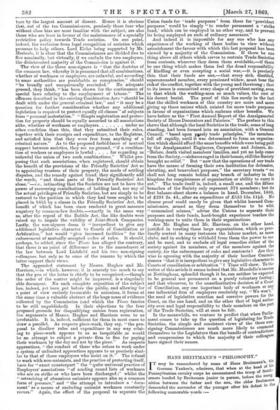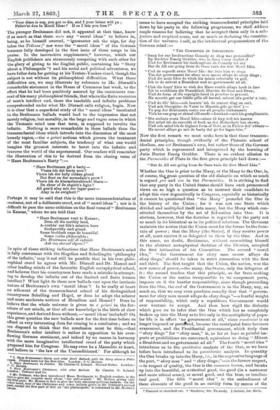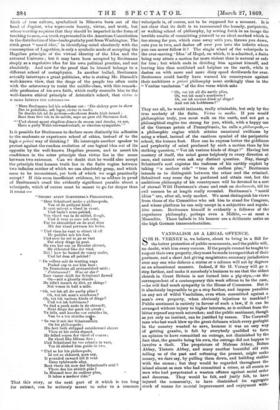HANS BREITMANN'S "PHILOSOPHY"
TT may be remembered by some of Hans Breitroann's, the German Yankee's, admirers, that when at the head of his Pennsylvanian cavalry corps he encountered the troop of Seuth. emers headed by Breitmann junior in person, before the recog. nition between the father and the son, the elder Breitmann demanded the surrender of the younger after his defeat in the following memorable words :—
"Your dime is oop, you got to die, and I your briest will pe ; Feliev'st don in Moral Ideas ? If so I lets you free ?"
The younger Breitmann did not, it appeared at that time, know if so much as that there were any "moral ideas" to believe in, being, as he himself averred, " ignoranter ash the Digs, for dey takes the Tribune ;" nor were the "moral ideas" of the German bummer fully developed in the first issue of these songs in his praise. In the instructive supplements,* however, which our English publishers are strenuously competing with each other for the glory of giving to the English public, containing his "Story about a Philosopede "-t and his social and political adventures, we have faller data for getting at his Teuton-Yankee creed, though the subject is not without its philosophical difficulties. What those difficulties are, we may illustrate by reference to Mr. Disraeli's remarkable statement in the House of Commons last week, to the effect that he had been positively assured by the unanimous consent of his many philosophical friends, that where the finite resources ,of man's intellect end, there the insoluble and infinite problems -comprehended under what Mr. Disraeli calla religion, begin. Now it is clear that a superficial study of the "moral ideas" inculcated in the Breitmann ballads would lead to the impression that not merely religion, but morality, in the large and vague sense in which the Teutonic mind uses that term, is supposed to involve the infinite. Nothing is more remarkable in these ballads than the transcendental ideas which intrude into the discussion of the most homely topics,—the a priori notions which govern the treatment of the most familiar subjects, the tendency of what one would imagine the grossest interests to burst into the infinite and traverse the world of the supersensnal. Our readers will remember the illustration of this to be derived from the closing verse of "Hans Breitmann's Barty ":—
" Hans Breitmann gif a barty Vhere ish dat barty now ?
Vhere ish der Infly °olden glond Dat float on der moundain's prow ?
Vhere ish de himmelstrahlende Stern—
De shtar of de shpirit's light ?
All gon'd afay mit der lager-peer Afay in de ewigkeit !"
Perhaps it may be said that this is the mere transcendentalism of -sentiment, not of a deliberate creed, not of "moral ideas " ; nor is it .difficult to pass the same criticism on the final verse of " Breitmann in Kansas," where we are told that
"Hans Breitmann vent to Kansas ; Droo all dis earthly land, A-vorkin' out life's mission here Soobyeetifly mid grand. Some beoblesh runs de beautiful Some vorks philosophie ;
Der Breibnann solf de infinide Ash von eternal shpree ! "
In spite of these striking indications that Hans Breitmann's mind is fully conversant with the Hegelian and Schellingite 'philosophy of the infinite,' may it not still be possible that in his true philosophical creed he agrees with Mr. Disraeli and Dr. AIansel and -other leading minds of the favourite English metaphysical school, and believes that his countrymen have made a mistake in attempting to develop the infinite out of the limited and finite human intellect? What light do these new ballads cast upon the intrinsic nature of Breitmann's own 'moral ideas '? Is he really at heart an adherent of the transcendental school of his distinguished -countrymen Schelling and Hegel, or does he adopt the soberer and more moderate notions of Hamilton and Mansel ? Does he .believe that the whole universe is given us a priori in the furniture of our minds, or that all our knowledge is the birth of slow -experience, and derived from without,—' moral ideas' included? On this great question the new ballads now for the first time before us afford us very interesting data for coming to a conclusion ; and we are disposed to think that the conclusion must be this,—that Breitmann's sober intellect is rather in opposition to his overflowing German sentiment, and indeed by no means in harmony -with the more imaginative intellectual creed of the party which Proposed him for Congress. He may even be a Manselite at heart, and believe in 'the law of the Unconditioned.' For although he
seems to have accepted the striking transcendental principles laid down by his party in the following programme, we shall adduce
ample reasons for believing that he accepted them only in a subjective and sceptical sense, not so much as declaring the constitu
tion of the universe itself, as the intellectual prepossessions of the German mind :—
"Tax Corrimars or INSTRUCTION.
"Deno for our Insdrnetions Comedy do ding was protocollirt* By Docktor Emsig Grubler, who in Jona vonce studirt ;t Und for Breitmann his insdrugtions de Comedy tid say Dat de All out-going from de Ones vash die first Moral Ida°.
"Und de segondt crate Moral Id& dat into him vo rings Vu dat government for efery man moost allays do efery dingo; Und die nest Ida° do vitch his mindt esbecially ye gall, Ish to do mitout a Bresident mid no government ad all.
"Und die foul' Idris ve'wish dor Hans vouldt allays koeb in flew Ish to cooldifate die Peaudifool, likeviso de Goot mid Drue ; Und de form of die oopright-hood in practise to present, He moosht get our liddle pills all bused, initout id's gostin' a cent, "Und de lift' Ides—ash learnin' ish do °retest ding on earl, Had ash Shoopider de Vater to Minerfa gife ge-birt' :— V° peg dat Breitmann oonto oos all pooplic tockuments Vich he can grap or shteal vill sendt—franked—mit his gomplimente.
" Die sechste crate Moral Idee—since id fery veil ish known Dat mind ish de resooldt of food, as der Molesehott has shown, Und ash mind Mae highest form of Gott, as in Fichte dot' abbearHe moost allays go mit de barty dat go for lager-bier."
Now the first remark we must make here is that these transcen
dental principles, though evidently of the Platonic school of idealism, are not Breitmann's own, but rather those of the German party which is represented and interpreted by the learning of Juris Doctor Emsig Grubler. There is an evident allusion to the Partnenides of Plato in the first great principle laid down:—.
"Dat de All out-going from de Ones vash die first Moral Idoe."
Whether the One is prior to the Many, or the Many to the One, is, of course, thwreat question of the old dialectic on which so much is argued pro and con in the Purnienides. It is striking to find
that any party in the United States should have such pronounced views on so high a question as to instruct their candidate to adopt this view dogmatically in Congress, especially as historically
it cannot be questioned that "the Many" preceded the One in the history of the Union ; for it was not one State which
divided and multiplied itself into many, but the Many which con stituted themselves by the act of federation into One. It is obvious, however, that the doctrine is regarded by the party not so much in its historical as in its political relations. The Germans maintain the notion that the Union must for the future be the foun
tain of power ; that the Many (the States), if they receive power at all, must receive it as delegated to them by the One. And in
this sense, no doubt, Breitmauu, without committing himself to the abstract metaphysical doctrine of the Elastics, accepted the first intimation of his Committee. 'rile second "moral idea," "dat Government for efery man moost allays do efery dings," should be taken in strict connection with the first and third. The first taught that the Union, the nation, was the new source of power,—the many, the States, only the delegates of it ; the second teaches that this principle, so far from making the Union or the nation irresponsible to its component parts, imposes on it the heavier responsibility, since though proceeding
from the One, the end of the Government is in the Many, nay, so much so, that we may even proclaim roundly that that "govern ment for efery man moost allays do efery dings "—a fearful weight of responsibility, which only a republican Government would ever venture to accept. And then how rigid the dialectic which goes on to infer that the One which has so completely broken up into the Many as to live only in the multiplicity of popular life is in effect no government at all,' since constraint is no longer imposed or percgtved, because the centripetal force becomes
evanescent, and the Presidential government, which truly does "efery dings" for "efery man," is, so far at least as painful im posts or probibitions are concerned, equivalent to doing " Mitout a Bresident and no government ad all." The fourth "moral idea"
introduces us to the qualitative analysis of the One, as we have before been introduced to its quantitative analysis. In quantity the One breaks up into the Many, i.e., in the expressive language of the poet, "efery man" and "efery dings ;"—in the former respect, —in respect of quality, the One is the summuni bonum, and breaks up into the beautiful, or wsthetical good, the good (in a narrower and more ethical sense), or moral good, and the true, or intellectual good. The fifth "moral idea is the embodiment of these elements of the good in an earthly form by means of the birth of true culture, symbolized in Minerva born out of the head of Jupiter, who represents beauty, virtue, and truth, but whose worship requires that they should be imparted in the form of teaching to men,—a truth represented in the American Constitution in the distribution of blue-booksgratisby post from Washington. The sixth great "moral idee," in identifying mind absolutely with the consumption of Lagerbier, is only a symbolic mode of accepting the Hegelian principle of the virtual identity of the Idea and the external Universe ; but it may have been accepted by Breitmann simply as a regulative idea for his own political practice, and not absolutely. And now for the proof that he himself belongs to a different school of metaphysics. In another ballad, Breitmann actually interrupts a great politician, who is stating Mr. Disraeli's well-known view, that the dregs of the people too often unite with the aristocracy to resist the middle-class, with this remarkable profession of his own faith, which really commits him to the well-known ethical principle of Aristotle's school, that virtue is a mean between two extremes:— "Here Breltmann led his schcleani Out: 'Dis shdory goes to show Dat in poledicks, ash lager, virus in medio.
De drecks ish ad de pottom—de skoom Roads high inteed ; Boot daas bier ish in de mittle, says an goot old Sherman lied.
shoost spout elegdion-dimes de mom nud drecks, ve see, Have a Filly Wahl-verwandtschaft, or election-sympathie.' "
Is it possible for Breitmann to declare more distinctly his adhesion to the moderate or experience school of ethics, instead of to the high a priori way of thinking ? He interrupts another speaker to protest against the random evolution of one logical idea out of its opposite by the well-known Hegelian process, and to assert his confidence in the sober principle that virtue lies in the mean between two extremes. Can we doubt that he would also accept the principle that human truth lies in the finite region between two infinites neither of which we can absolutely grasp, and which seem to be inconsistent, yet both of which we inlet practically accept? If this seem insufficient evidence, let us adduce in proof of Breitmann's creed the evidently significant parable about a velocipede, which of course must be meant to go far deeper than it seems :—
" SHTORY APOUT SCHNITZERV8 PHILOSOPEDE.
"Herr Schnitzerl make a philosopede, Von cf de pullyest kind;
It vent mitout a vheel in vront, Und hadn't none pehiud.
Von vheel vas in de mittel, dough, Und it vent as sure ash ecks, For he shtraddled on de axel dree Nit der Theel petween his leeks.
"Und Then he rant to shtart id off He paddlet mit his feet, Und soon he cot to go so vast flat efery dings he peat. He run her out on Broader shtreet, He shkeeted like der rind, Bei ! how he bassed de vancy crabs, Und lef dem all pehind !
"De yellers mit de trotting nags Pooled oop to see him bass: De Deutsehers all erstaunished saidt Potztausend ! Was 151 das?'
Boot vaster shtill der Schnitzerl flowed On—mit a ghastly simile, He tidal toonch de dirt, py shings ! Not vonce in half a mile.
"Oh, rot ish all die eartly plies? Oh, rot ish mates soocksess? Oh, Tot ish various kinds of dings? Und vot ish hobbiness?
Ve find a pank node in de shtreedt, Next dings der pank ish preak ; Vs falls, und knocks our outsides in, Van ye a ten shtrike mike.
"So vas it mit der Schnitzeirein
On his philosopede ;
His feet both shlipped outeideward shoost Vhen at his extra shpeed.
He felled oopon der vheel of course ; De Thee' like blitzen flew ; Und Schnitzerl he roe schnitz in vact, Vor id slished him guide in two.
"Und as for his philosopede, Id cot so shkared, men say, It pounded onward till it Tent Ganz tyfelwards day, Boot vhere ish now der Schnitzerl's soul ?
Vhere dos his shbirit pide? In Himmel troo de endless pine,
It takes a medeor ride."
That this story, or the next part of it which is too long for extract, can be seriously meant to refer to a common velocipede is, of course, not to be supposed for a moment. Is it not clear that its drift is to recommend the homely, peripatetic, or walking school of philosophy, by setting forth in an image the terrible results of committing yourself to an ideal method which is too strong for you, which runs away with you, throws you down, cuts you in two, and dashes off over you into the infinite where you can never follow it? The single wheel of the velocipede is the ever-moving ' Idea ' of Hegel, on which, it is admitted, a finite being may attain a motion far more violent than is natural or safe for him ; but which ends in dividing him against himself, and leaving him thus mutilated and helpless on the earth, while it dashes on with more and more dizzy speed devilwards for ever. Breitmann could hardly have warned his countrymen against their ambitious a priori philosophy more strikingly than in the " Vanitas vanitatum " of the fine verse which asks
"Oh, Tot ish all die eartly plies, Oh, Tot ish man's soocksess ? Oh, vot ish various kinds of dings? And rot ish hobbiness?"
They are all, he would intimate, really attainable, but only by the true modesty of the finite. Virtus in medio. If you would philosophize truly, you must walk on the earth, and not get a philosophical engine too strong for you, which, with a happy use of the German patois of Pennsylvania, he calls a philosopede,— a philosophic engine which attains unnatural swiftness by using a wheel, instead of the cautious symbol of the peripatetic school, the human foot. How can he express better the giddiness and perplexity of mind produced by such a motion than by his striking question, " Vot ish various kinds of dings ?" Having lost mastery of itself, the mind gazes helplessly in every direction at once, and cannot even ask any distinct question. Nay, though Schnitzerl's soul expiates the rashness of his earthly exploit by taking "a medeor ride" " troo de endless plue," Breitmana intends us to distinguish between the crime and the criminal, Schnitzerl may some day be pardoned and attain rest, but the ambitious philosophy of his countrymen will be devoted to a sort of eternal Wild Huntsman's chase and rush on devilward; till its evil essence be at length really revealed. Breitmann's "moral ideas" are, after all, truly modest. We must distinguish his views from those of the Committee who ask him to stand for Congress, and whose platform he can only accept in a subjective and regulative sense. Breitmann himself is evidently a follower of the experience philosophy, perhaps even a Millite, — at most a Manselite. These ballads in his honour are a deliberate satire on the high German transcendentalism.




































 Previous page
Previous page